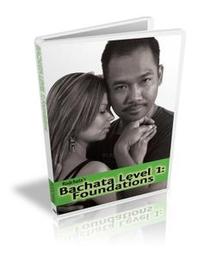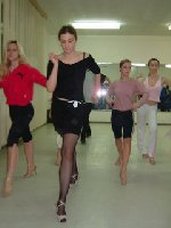
Dear Rodney,
I am from ____, ____. I am not sure if you remember me but I am that person that always bought you a shot of Stoli in WSC Social. I also took your workshops at Bachaturo Festival. The reason I am emailing you is because I want your advice.
I recently stumbled into the promotion business. I had my first event last month and people loved it! But really, I didn’t know was I was doing. Everyone here wants me to do a festival. My question is, what do I need to do if I continue doing this, and what are the things I should and should not be doing? -
It’s all a matter of passion. Accidental promotion isn’t actually a good way to start. You have to treat it just like any other business.
It started as a hobby for me and later on became a business. (it’s still a hobby in the worse way, but don’t tell my wife, lol)
I have a feeling that you are going to do these anyway because I can tell that you have just seen the good side of it - you made a little bit of money and everyone is kissing up to you.
Here’s my Top 20 Tips.
1) Your first event, depending on its demand and saturation, will be sucessful - 80% of Grand Opening are usually a success.
2) It gets complicated and harder to do the 2nd event due to competitors or a territorial promoter sabotaging your event. Your original ideas will be copied. You might lose money for 2 yrs in a row.
3) Everyone will be nice to you especially the performers and teachers - don’t mistake their kindness as a token of friendships. As long as you are paying them, they will love you. They’re like cats, they will keep purring as long as you keep feeding them.
4) You have no real friends in this business. If you have one, test them. Don’t trust anyone.
5)When you lose money, you will make a few unhappy people when you can’t pay them on time. (Yes you are going to lose money-I don’t know of anyone who didn’t.)
6) Your competitors are always out to outdo you - this will make you more innovative. Don’t kill them.
7) Make sure your girlfriend or wife understand where you are coming from; vision, goals, dreams.
8) Never partner up with anyone - it will always end up in a bad way.
9) Make sure your overhead is always low. Always do your math. Project your profit and calculate your expenses.
10) It’s important to set a budget. Don’t go over the budget.
11) There will be many teachers and performers and music bands contacting you. Some will offer free services, and some will offer discounts of their so-called Star salaries. Don’t fall for it - always refer back to you goals and budget. There no such thing as a free meal. Flights, Hotel Rooms, or Food Allowances adds up!
12) Don’t invite everyone (teachers). Inviting everyone means you will lose money.
13) Treat the customers well. Provide great customer service. They are the life of your event. They are the ones that help you pay your bills. Listen to their feedback.
14) Up and coming artists will try to seek your help in promoting them, be nice to them, but decline the idea. They will change and will treat you like they never owed you anything.
15) Don’t hire artists that doesn’t social dance because your customer will stop attending.
16) Hire a staff that has the same passion as you do. They will help you for the love of the dance.
17) Invite your competitors, don’t ban them.
18) Don’t leave your day job.
19) Have your partners (if you have any) sign a contract of your partnerships.
20) Have a lawyer check and review your hotel contract before signing it.
21) When a competitor tries to help you, don’t mistake the kindness, he is studying you and looking for weaknesses.
22) Never talk bad about anyone on facebook messages. Just like a secret celebrity sex tape gets leaked out, so are FB messages.
23) Random people or even acquaintances can give you good or bad information. Always seek the other side of the story. You cannot trust a one-way information-always verify with several sources
24) Don’t hire artists that gets too drunk and acts inappropriately with others. It’s all about being professional. Your customer will thank you for it.
25) Know when to stop. At the end of the day, you loved ones are more important than your hobbies or fake friends in the dance community.
Important Tip about Business Partrners:
- The reason I mentioned signing a contract is because 99% of the time, two people usually have different ideas, visions and agendas. Anyways, good luck...
I am from ____, ____. I am not sure if you remember me but I am that person that always bought you a shot of Stoli in WSC Social. I also took your workshops at Bachaturo Festival. The reason I am emailing you is because I want your advice.
I recently stumbled into the promotion business. I had my first event last month and people loved it! But really, I didn’t know was I was doing. Everyone here wants me to do a festival. My question is, what do I need to do if I continue doing this, and what are the things I should and should not be doing? -
It’s all a matter of passion. Accidental promotion isn’t actually a good way to start. You have to treat it just like any other business.
It started as a hobby for me and later on became a business. (it’s still a hobby in the worse way, but don’t tell my wife, lol)
I have a feeling that you are going to do these anyway because I can tell that you have just seen the good side of it - you made a little bit of money and everyone is kissing up to you.
Here’s my Top 20 Tips.
1) Your first event, depending on its demand and saturation, will be sucessful - 80% of Grand Opening are usually a success.
2) It gets complicated and harder to do the 2nd event due to competitors or a territorial promoter sabotaging your event. Your original ideas will be copied. You might lose money for 2 yrs in a row.
3) Everyone will be nice to you especially the performers and teachers - don’t mistake their kindness as a token of friendships. As long as you are paying them, they will love you. They’re like cats, they will keep purring as long as you keep feeding them.
4) You have no real friends in this business. If you have one, test them. Don’t trust anyone.
5)When you lose money, you will make a few unhappy people when you can’t pay them on time. (Yes you are going to lose money-I don’t know of anyone who didn’t.)
6) Your competitors are always out to outdo you - this will make you more innovative. Don’t kill them.
7) Make sure your girlfriend or wife understand where you are coming from; vision, goals, dreams.
8) Never partner up with anyone - it will always end up in a bad way.
9) Make sure your overhead is always low. Always do your math. Project your profit and calculate your expenses.
10) It’s important to set a budget. Don’t go over the budget.
11) There will be many teachers and performers and music bands contacting you. Some will offer free services, and some will offer discounts of their so-called Star salaries. Don’t fall for it - always refer back to you goals and budget. There no such thing as a free meal. Flights, Hotel Rooms, or Food Allowances adds up!
12) Don’t invite everyone (teachers). Inviting everyone means you will lose money.
13) Treat the customers well. Provide great customer service. They are the life of your event. They are the ones that help you pay your bills. Listen to their feedback.
14) Up and coming artists will try to seek your help in promoting them, be nice to them, but decline the idea. They will change and will treat you like they never owed you anything.
15) Don’t hire artists that doesn’t social dance because your customer will stop attending.
16) Hire a staff that has the same passion as you do. They will help you for the love of the dance.
17) Invite your competitors, don’t ban them.
18) Don’t leave your day job.
19) Have your partners (if you have any) sign a contract of your partnerships.
20) Have a lawyer check and review your hotel contract before signing it.
21) When a competitor tries to help you, don’t mistake the kindness, he is studying you and looking for weaknesses.
22) Never talk bad about anyone on facebook messages. Just like a secret celebrity sex tape gets leaked out, so are FB messages.
23) Random people or even acquaintances can give you good or bad information. Always seek the other side of the story. You cannot trust a one-way information-always verify with several sources
24) Don’t hire artists that gets too drunk and acts inappropriately with others. It’s all about being professional. Your customer will thank you for it.
25) Know when to stop. At the end of the day, you loved ones are more important than your hobbies or fake friends in the dance community.
Important Tip about Business Partrners:
- The reason I mentioned signing a contract is because 99% of the time, two people usually have different ideas, visions and agendas. Anyways, good luck...


 RSS Feed
RSS Feed
